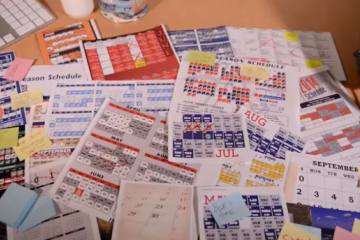Coordinating a small group of friends for dinner can be challenging enough. Imagine building a schedule for thousands of students.
For Paige Stanley, a Johns Hopkins University senior, the difficulty of the undertaking is precisely what makes the final exams scheduling process so intriguing.
Stanley is part of a small team of students who help to develop the exam schedule using an algorithm built by JHU faculty and students. The larger scheduling group, which mainly tackles scheduling for minor league baseball leagues and umpires, is also taking a second look at the current algorithm and figuring out how to make it better.
Creating an algorithm that can take matrices of student data and boundaries of dates and times, and then output a solution, isn't easy. The process requires the use of binary integer programming, a super computer, and MatLab coding language to come up with an answer.
"It takes some creativity and thought," adds Stanley, who is the student leader of the final exam team in the Department of Applied Mathematics and Statistics' scheduling group.
Stanley said she appreciates the challenge and the "moments you get stuck and finally figure out a solution to them."
The students meet to troubleshoot, ask questions, and stress-test different variations of the schedule based on the requirements the registrar gives them.
One of their goals is to find ways to limit the number of instances in which students have two exams in a row or an exam in the afternoon followed by another the next morning. The current exam period lasts 10 days—the final exam period ends Friday—but students in the scheduling group are searching for ways to optimize the schedule even if the period were shortened.
"Nobody wants to have two exams the same day," Stanley said.
Donniell Fishkind, an associate research professor and director of undergraduate studies in the Department of Applied Mathematics and Statistics, serves as the scheduling group's advisor, alongside co-director and JHU Informations Security Institute professor Tony Dahbura. Fishkind said that students in the group gain real-world experience when figuring out the solutions to these difficult problems for a client or decision-maker.
"[It's] an opportunity for undergraduate students to get some operations research and consulting experience … in ways that do have an impact," Fishkind said.
Using math to schedule exams makes the process easier and faster. At one point, scheduling was done by hand on a piece of paper. In 2015, Fishkind and some of his students came up with the current finals algorithm as part of the scheduling group's work.
The program has been used ever since.
"These problems are hard," Fishkind said. "If you don't approach it mathematically, you get something sub-optimal."
Posted in Student Life
Tagged mathematics, applied mathematics









